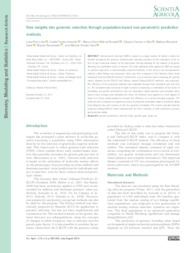New insights into genomic selection through population-based non-parametric prediction methods.
New insights into genomic selection through population-based non-parametric prediction methods.
Author(s): LIMA L. P.; AZEVEDO, C. F.; RESENDE, M. D. V. de; SILVA, F. F. e; SUELA, M. M.; NASCIMENTO, M.; VIANA, J. M. S.
Summary: Genome-wide selection (GWS) is based on a large number of markers widely distributed throughout the genome. Genome-wide selection provides for the estimation of the effect of each molecular marker on the phenotype, thereby allowing for the capture of all genes affecting the quantitative traits of interest. The main statistical tools applied to GWS are based on random regression or dimensionality reduction methods. In this study a new non-parametric method, called Delta-p was proposed, which was then compared to the Genomic Best Linear Unbiased Predictor (G-BLUP) method. Furthermore, a new selection index combining the genetic values obtained by the G-BLUP and Delta-p, named Delta-p/G-BLUP methods, was proposed. The efficiency of the proposed methods was evaluated through both simulation and real studies. The simulated data consisted of eight scenarios comprising a combination of two levels of heritability, two genetic architectures and two dominance status (absence and complete dominance). Each scenario was simulated ten times. All methods were applied to a real dataset of Asian rice (Oryza sativa) aiming to increase the efficiency of a current breeding program. The methods were compared as regards accuracy of prediction (simulation data) or predictive ability (real dataset), bias and recovery of the true genomic heritability. The results indicated that the proposed Delta-p/G-BLUP index outperformed the other methods in both prediction accuracy and predictive ability.
Publication year: 2019
Types of publication: Journal article
Unit: Embrapa Forestry
Keywords: Arroz, Asian rice, Genetic gain, Genomic prediction, Oryza Sativa, Selection index
Observation
Some of Embrapa's publications are published as ePub files. To read them, use or download one of the following free software options to your computer or mobile device. Android: Google Play Books; IOS: iBooks; Windows and Linux: Calibre.
Access other publications
Access the Agricultural Research Database (BDPA) to consult Embrapa's full library collection and records.
Visit Embrapa Bookstore to purchase books and other publications sold by Embrapa.

